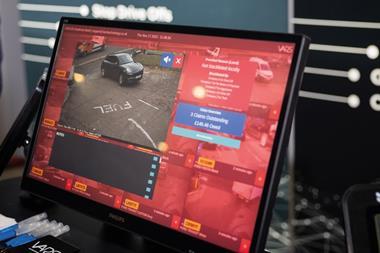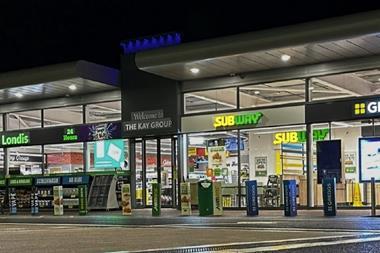
There have been a number of recent news pieces in the media relating to crime suffered by retailers: some generic, one or two specific to the fuel sector.
The one which made the headlines across the board was the shocking report from the Co-op relating to their experience of criminal and ant-social behaviour in their network of stores so far this year.
That report was dramatic for two reasons: firstly, the sheer scale of the problem – “about 1,000 cases of crime, shoplifting and anti-social behaviour in its shops every day in the six months to June”.
Not per month, or per week, but every day. That’s quite hard to process – unless, of course, you’re a retailer and are used to seeing similar things happening on your premises day-in and day-out.
Secondly, there was the lament that “many police forces did not prioritise retail crime, with, on average, 71% of serious retail crime not responded to by police” – which may have been ‘news’ to the general public, but which forecourt retailers in particular will hardly find surprising, given the experience of this industry with fuel theft (aka ’drive-offs’) over the years.
It has been pretty well accepted in the fuel retailing industry for decades that the police in general have rarely taken much interest in the problem of fuel theft.
Occasionally, one or other local force will stage a very public campaign targeting fuel thieves; lots of pictures in the local news pages of police cars parked on petrol forecourts, statements about ’zero tolerance’ from the Divisional Superintendent, followed a week or two later with a story or two about the appearance in court of a couple of offenders who happened to be unlucky enough to be traced and arrested. And when the campaign ends, it’s back to normal – if they don’t tell you that it’s just a ‘civil matter’ (ie not really a criminal offence) the most you can expect is that you’ll be given a crime number to record.
The general experience of most fuel retailers is that only when the police are already interested in a particular individual or vehicle, and that individual or vehicle happen to drive-off a forecourt without paying and the event has been conveniently recorded for them (in High-Definition) on CCTV, will they bother to take any notice.
Fuel theft may be the most common crime on the typical forecourt, but it’s hardly the only one. Leave aside the ‘ordinary’ shop-lifting, such as groups of school-age children packing into the shop at one go with one buying something while half-a-dozen others fill their pockets with anything they can find, and there is the more violent kind.
The people in ‘hoodies’ carrying knives (or sometimes firearms) who break through barriers and threaten staff in order to empty the till of cash and grab whatever alcohol or tobacco they can stuff into a carrier bag. That sort of offence is one that many retailers experience in many convenience stores across the country, not just petrol forecourts. The same applies to thefts of stock from shops that are closed overnight – with alcohol and tobacco again the prime targets – sometimes involving massive (and costly) physical damage to premises by ram-raids using anything from SUVs to JCBs.
In all of this, apart from the obvious cost of losing stock, and the damage caused by many thieves, there are the effects on site staff. Even if they avoid serious injury, staff members who’ve experienced verbal and/or physical threats can be off work for days or weeks after an event due to stress. Some commentators have suggested that shop owners should simply hire or employ more security staff to guard their premises – but apart from the additional cost, there’s also a limit to how effective those security staff can be: they do not have ‘police powers’, and in general they are only slightly more capable of dealing with armed offenders than any other employee.
There are limits to the measures that site owners can take to protect their staff and goods. Many owners have already reached those limits – in some cases because their insurers have insisted on more and more preventative measures over the years as a condition of offering continuing insurance to the business (and that’s without even thinking about the increase in insurance premiums).
As one retailer told me a short while ago when he was proudly opening his re-vamped shop, he had just installed the most sophisticated CCTV system on the market, but as far he was concerned it was simply there to protect his staff: not that he actually expected it to discourage any criminal activity on site, but to protect his staff from any false accusations of either ‘targeting’ individuals whom they suspected of theft, or that they ‘over-responded’ to any violent or threating behaviour from a customer.
From violent theft to the other sort: scams. In the same week that the Co-op raised the problem of the first type, there was the story right here in Forecourt Trader of a forecourt in Wales which received apparent instructions from ‘head office’ to load £10Ks-worth of stock into a courier van for ‘transfer’ to another site. We all know the rest. And we all know that scams, whether by email, text messages or ‘phone calls, can initially look very ‘genuine’, anybody can be fooled, don’t laugh just because you’ve not fallen for one (yet) yourself, etc. But even so…
This type of ‘stock transfer’ scam isn’t new. We even featured it here in these pages a very long time ago. Perhaps too long ago. So, the basic practice for anyone receiving any kind of message to transfer or transport money or stock (which is after all, just another form of money) is this: ignore all the contact details in the message, whether ‘phone numbers, email addresses or web-links. Then contact people within your organisation with whom you’ve dealt regularly before – such as the accounts team at ‘head office’, and/or the site to which the stock is supposedly being transferred – using the normal channels of ‘phone or email that you’ve used before. Those people will know you, or can easily check who you are, and they will also know whether any such transfer has been arranged. Someone in the accounts department will have had to authorise a £10K stock transfer before arranging for a courier. End of scam, as simple as that.
Criminality isn’t just a problem on the retail front, of course. It’s another one of those seemingly intractable problems in our society generally. And it may not be fair to criticise the police too heavily for their apparent failure to respond to it in the way that we expect or wish them to do. Like any other organisation they have limited resources and are given who-knows-how-many ever-shifting ‘priorities’ by government (and public opinion) on which to spend them. Retailers can only do so much, as well, and many are already doing it. But when it comes to con-tricks and scams, those are not usually difficult to prevent just by some basic common sense checks and sound administrative training. At least that might allow the police to devote more of their resources to combatting the physical crime wave.
































